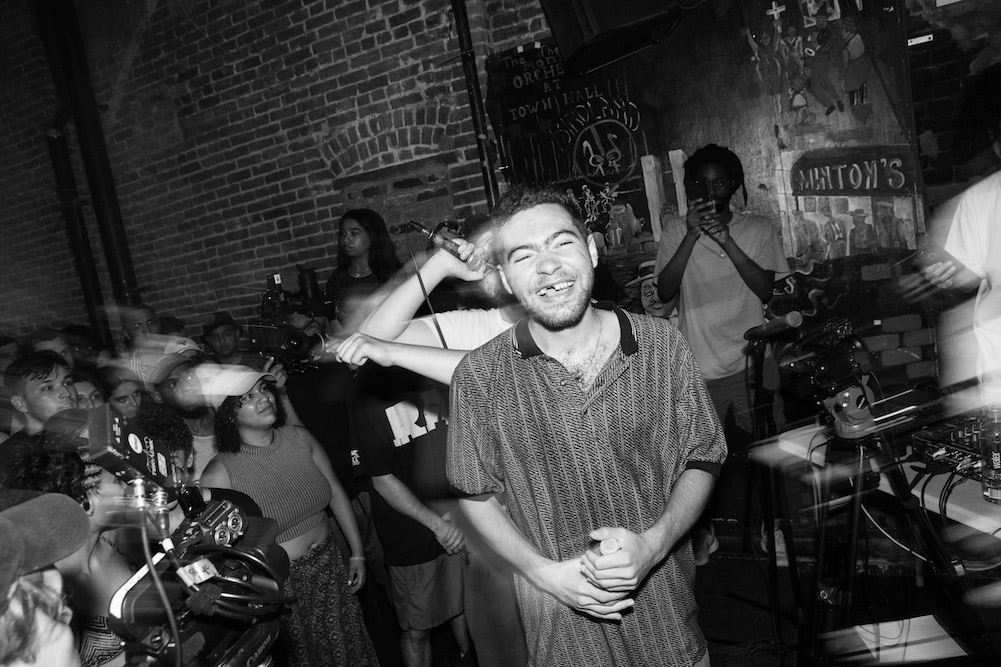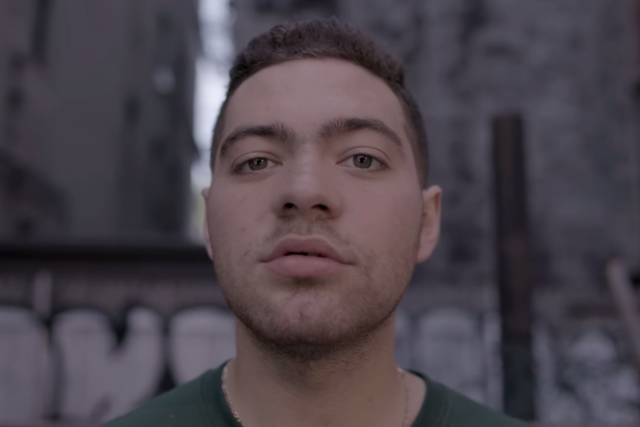Last Monday afternoon, pedestrians in paper glasses stared at the sky, mouths agape like chickens in the rain as they gawked at the solar eclipse. As the phenomenon took place in the sky over New York, Ratking’s intrepid rapper Wiki was seated in a basement studio at XL Recordings’ headquarters in SoHo with two cohorts, one of whom was looking through Adobe Premiere’s inverted pyramid of light blue editing blocks, which would produce the video for “Mayor,” a single off the rapper’s new album No Mountains in Manhattan. Wiki and I acknowledged the eclipse as an arbitrary conversation icebreaker, briefly commiserating over how it would’ve been nice to have those protective sunglasses, before shrugging the minor disappointment off with apathetic silence. There’s plenty to obsess over within the abundance of New York, and the sun isn’t one of them.
At 23, Wiki doesn’t look like he’s astonished by much; there’s more hushed confidence than nervy anticipation when I meet him, even though we’re a few days away from the release of No Mountains in Manhattan, his debut solo album. A reason for his calmness could be the approval of XL Recordings’ owner Richard Russell, who strolls in wearing a slightly oversized orange shirt to dap up Wiki midway through our conversation. He’s also aware that his name holds weight, and believes it ought to hold more. “I feel like I get recognition, but sometimes I’m like—maybe with this album it’ll change, who knows,” Wiki says. He often doubles back in conversation to hedge his arguments. “But I feel a little like, ‘Come on bro. I’m dropping hella bars. Are you guys not hearing this?’ But it’s all good.” As he finishes the thought, his voice sweetens as the disaffected cool returns.
Wiki first rose to prominence in 2011 as the face of Ratking, linking up with shamanistic childhood friend Hak and producer Sporting Life to release their debut and thus far only album, So It Goes, three years later. A prevailing feeling in the city at the time was nostalgia for a New York that was gritty but creatively fertile, regardless of if that romanticism actually applied to the current day. The New York of So It Goes isn’t a memory but a construct in motion with present possibilities. As Sporting Life’s chaotic production dramaticized the city’s core contradiction—at once expansive and claustrophobic—Wiki’s swirly, gaptooth-affected delivery found him using his knotty technical delivery to spin off punk rallying cries (“The earth is fucked, the city is gone!”).
If there was one knock against Wiki’s prodigious performance, it was how his how lines and flow were switched up wantonly, making it sometimes difficult to separate his meaning from his words. The Wiki of Ratking reached to condense numerous perspectives and influences into something finite. As a soloist, Wiki pivots to add color to what’s immediately in his purview. These days every bar, ad-lib, and mixing decision must come with necessity. “It’s still a struggle for me because I have a lot to say and I want it to be dope,” Wiki says. “But on a songwriting perspective, it’s about how can you simplify it the most but get across what you’re trying to get across.”
This more minimalistic approach took him to some unexpected places on his 2015 solo mixtape Lil Me, which includes the playpen trap of “God Bless Me” and a vivid night out on the Kaytranada-produced “3 Stories.” No Mountains in Manhattan—which gets his title from a line in Martin Scorsese’s Mean Streets—trades So It Goes’ sonic bedlam for nimble, accessible soulfulness. Wiki’s hemmed-in focus pays off in tracks like “Pretty Bull,” where the line “Ballin’ while I throw it in the trash” is a Jim Jones reference that acts as a joyful piece of shared juvenile minutiae.
Wiki says he’s cool with the other two members of Ratking (Sporting Life pops up on No Mountains in Manhattan), but we frequently refer to group in the past tense during our conversation, which is edited and condensed for clarity below. He also seemed rushed to get to what comes after his debut album drops. At one point, Wiki mentioned his habit of writing down ideas that pop into his head, sometimes even scribbling thoughts onto his hands and forgetting about the markings before washing them away. Today, it’s “NOTEBOOK” in blue ink, a reminder that he left his girlfriend’s college notebook that he leaves ideas in at the office. He rolled his chair to my left, grabbed the book from the couch’s arm, and started flipping through the sketches of zines, art pieces, merchandise. For Wiki, what’s concrete is just as exciting as the possibilities.
https://youtube.com/watch?v=o-ziihiGyFc%3Fecver%3D1
On “Cocoa ‘88” you rap “No man ever mastered nothin’ / That mentality’s disaster comin’.” Does that still describe your process?
Yeah definitely. It’s like, “Don’t always get too comfortable, always stay hungry, always,” you know what I mean? You always need to work for something, it can’t always come easy and shit like that. I think that sticks with me today.
You mentioned a while ago that listening to Jay-Z taught you to parse down your writing. Is that still a focus going into No Mountains in Manhattan?
Yeah, definitely simplifying. You could add all these extra words—not even wordplay, just extra rhymes, and things like that—just to do it. It needs to be necessary. I feel like you can tell, my old lyrics, it’s hella dense. I have stuff, that’s a little bit more…it’s still dense, which is a struggle for me, because I still have a lot to say and I want it to be dope, but on a songwriting perspective, how can you simplify it the most but get across what you’re trying to get across?
What cued the more introspective focus on Lil Me?
In Ratking, I was kinda [rapping from] this greater perspective. I’m kinda telling the stories of the city, it’s not fully like, “It’s Wik!”
People ask me, “What happened to Ratking?” Usually I’m like, “Yo, we just all wanted to do our own thing.” I really wanted to have control, and just do what I wanted to do. So that’s a big part of it: Being able to like, make the subject matter about my shit and about me. I can’t do that with Ratking: That’d be fucked up if it’s just about me. Lil Me got introspective, got personal, but it was still me having fun and shit and me making songs. It was a little less cohesive, whereas on [No Mountains in Manhattan], I’m trying to cut down on that and make it really [flow].
You don’t really have the same nostalgic bent some of your peers have.
Even [the Jim Jones reference] and shit like that: That’s a song that was out when we were like, kids. Everyone knows that. I’m not doing it to be New York; I’m doing it cause that’s me. So, it is what’s going on in my New York, now, versus “Yo, we gotta get this vibe, like, early ‘90s, New York.” Nah. I’m referencing the old shit cause like the Tunnel, but it’s the same party. It’s not all divided anymore.
https://youtube.com/watch?v=0vyzIp12DRQ%3Fecver%3D1
Is it weird stepping out on your own as a solo artist after seeing the critical praise that Ratking got?
Ratking had this mini cult following—they were like, “Oh damn, no, Ratking broke up”—and that was the challenge. It was definitely a challenge, but it was something I was excited for. I’m happy I learned from Ratking, and I’m happy that Ratking got that kind of following and fanbase because, from there, the ground work’s laid and I can go anywhere from that. It’ll always be connected to that on some level, no matter what any of us are doing.
Is Ratking still a thing?
People look at it and they’re like, it’s a band, and they broke up. But the idea of Ratking, it’s not done, it’s not gone. I’m cool with Sport—if that’s what you’re asking—and I’m cool with Hak now, too. It’s something that could happen down the line. It’s possible, but it would just need to be right. But it’s not dead.
How did your collaborative relationship with Your Old Droog develop [Droog and Wiki released their collaborative EP What Happened to Fire back in February]?
I linked with him like a year ago. He came to the crib, and we just worked on some tracks, chilled, and kicked it and shit. I really liked working with him because he was like, again, it was a challenge, being on his level, having to keep up with him and shit because he’s such a good emcee. The Secret Circle stuff [the supergroup that also includes Lil Ugly Mane and Antwon] is hella fun for me, because me Antwon, and Ugly Mane are like all kinda different. With Droog, it’s the same thing, but more grueling. It’s like, “We gotta get these bars up, come on.”
It just made me feel good to have that. I never really had that with Hak, because Hak wasn’t really the emcee. Now I have this emcee and I feel like we’re on some Ghost and Rae shit, you know what I mean?
We feel like we’re these emcees that got a chip on our shoulder, and we’re like, “Damn, we nice as fuck, no one really noticing that much.”
That chip on the shoulder is on New York rap in general or just you two?
It’s up to New York to [build itself]. Kendrick didn’t have to make any sacrifice on what he wanted to make, but everyone fucking with it, right? It’s up to you.
The things that are popping in New York, they’re popping because Bobby Shmurda came out, and Cardi B now, which is sick. It’s really up to the artist and shit. I feel like that’s the problem with New York: You’re either gonna make this type of shit and it’s pop, or you’re gonna stay true and be underground. But it really is up to you, and I think artists like Kendrick and other artists that are out that are big. It’s not about, “Oh, they don’t wanna listen to us because we’re from New York,” No. What’re you talking about? It’s New York.
People don’t generally associate hip-hop with the Upper West Side. Anybody ever gave you shit for being from there?
It’s not people giving me shit. It’s just taking me for who I am, you know what I mean? It’s not putting it on some type of other thing, and then it’s like, “Oh shit, he’s from the Upper West.” It’s already in the music. When I talk about New York, the Upper West Side is like a classic New York. It’s just the regular shit: The fucking bagels, and the fucking old ladies and the old guys reading the paper.
I look at it just like hip-hop, the genre. There’s kids from everywhere in the city getting involved in everything. You look at Style Wars, where the kid is like, “I went to Riverdale,” and he’s taking the train up from the Upper West. He’s just like, “I saw all this graffiti in the Bronx.” It’s just this thing where hip-hop is spreading like a motherfucking… So I’m more looking at it from the old perspective: As long as you’re in the city, within the culture, you’re part of a scene. You’re not just making it in your bedroom. You’re going out and playing shows in the streets. You’re really part of a community—whatever that community is.





